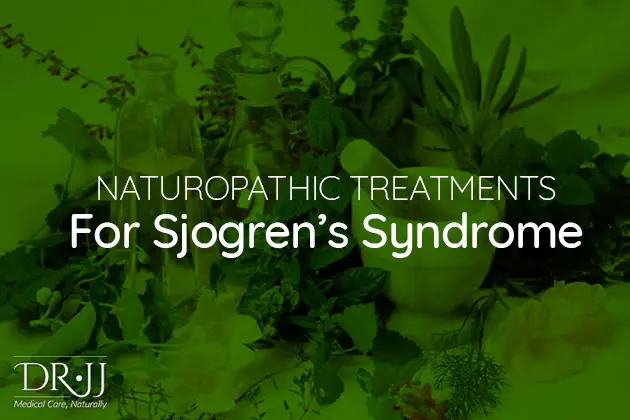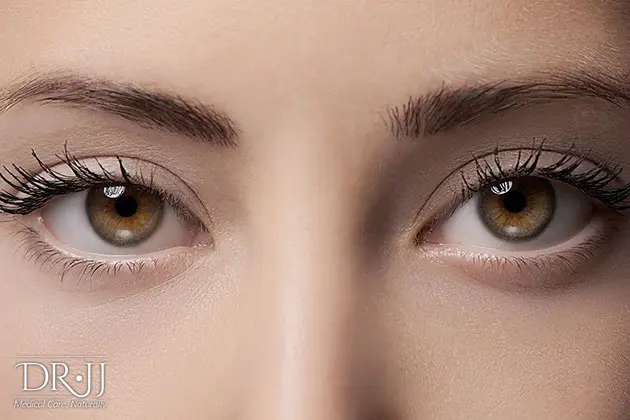
Compared to some of the other conditions naturopathic medicine can help with, Sjogren’s syndrome isn’t exactly a household name.
Sure, you might’ve heard of someone going to see a naturopathic doctor for treatment of ailments such as arthritis, migraines, or psoriasis.
But it’s less likely you’ve heard of naturopathic treatment for Sjogren’s syndrome.
Nonetheless, it may be more common than you think.
According to the Sjogren’s Society of Canada, more than 400,000 Canadians are afflicted with this disease.
It’s the equivalent of nearly the entire population of a city the size of Hamilton, Ontario being afflicted with a disease.
But what is Sjogren’s syndrome?
Where does it come from?
Who is at risk of contracting this disease?
And what can be done about it from a naturopathic perspective?
Keep reading to find out.
What Is Sjogren’s Syndrome?
Sjogren’s syndrome is an autoimmune disease.
This means it’s a disease that causes your body’s own immune system to see other parts of your body as invaders, like they would a bacterial or viral infection.
In the case of Sjogren’s syndrome, it causes your body to attack your salivary glands.
These are glands that are crucial for your saliva production.
Sjogren’s syndrome also impacts your lacrimal gland.
This is a tear shaped gland responsible for your tear production.
Sjogren’s syndrome can also impact multiple areas of your body.
These include:
- Your thyroid
- Your kidneys
- Your skin and hair
- Your lungs
- Your liver
RELATED: Intravenous Therapy For Liver Detoxification
It may also affect your joints, although this symptom is less common.
When it comes to your salivary and lacrimal glands, if left long enough they will lose the ability to produce saliva and tears.
As you can imagine, this would make life difficult.
Saliva plays an important role in your digestive health whereas loss of tears could bring on a range of eye and vision problems.
Additionally, a 2007 research paper by Montaño-Loza et al. found that even primary Sjogren’s syndrome increases your risk of liver disease.
RELATED: Naturopathic Treatments For Nonalcoholic Fatty Liver Disease (NAFLD)
That’s why early intervention is so important.
Does Sjogren’s Syndrome Act On Its Own?
In some cases, Sjogren’s syndrome occurs on its own or is the primary illness.
In these cases, we refer to it as “primary Sjogren’s syndrome”.
However, it may also accompany another illness in your body.
In this case, we call it “secondary Sjogren’s syndrome”.
It’s most commonly accompanied by connective tissue diseases.
According to a 2008 paper by Theander and Jacobsson, the presence of Sjogren’s syndrome may encourage certain autoimmune diseases to emerge.
These disorders primarily include lupus and rheumatoid arthritis.

What Are The Symptoms Of Sjogren’s Syndrome?
Because Sjogren’s syndrome attacks the lacrimal and salivary glands, it shouldn’t come as a terrible surprise that two of the most common symptoms of Sjogren’s syndrome are dry mouth and dry eyes.
Those with Sjogren’s syndrome have described it as like having sand stuck in their eyes.
This is hardly surprising considering the effects of dry eyes.
If you wear contact lenses, you might be able to remember a time where you’ve been late on taking them out.
Remember how uncomfortable the dry lens felt on your eyes?
Imagine feeling that on a daily basis.
Unfortunately, this is often the reality for people with Sjogren’s syndrome.
Other related symptoms include:
- Difficulty with bright light
- Eyelids sticking together in the morning
- Frequent crusting and residue in your eyelashes and eye corners
- Lips sticking to teeth
- Difficulty swallowing
- Tooth decay
- Fissures forming from the corners of your mouth
- Pain in your tongue
- Parotid gland swelling (another saliva producing gland)
- Fatigue
- Dry cough
- Genital dryness
It’s important to remember that the presence of these symptoms doesn’t necessarily indicate Sjogren’s syndrome.
You may show some or all of the above symptoms without testing positive for Sjogren’s syndrome.
For instance, dry eyes, dry mouth, and dry cough are also all symptoms of allergies.
RELATED: Allergies – What Causes Them, Common Symptoms, And Natural Remedies
Nonetheless, it might be a good idea to seek professional advice if you’re experiencing any of these symptoms for a prolonged period.
Speak to your naturopathic doctor for more information on how Sjogren’s syndrome is diagnosed.
Who Is At Risk For Sjogren’s Syndrome?
Anyone can develop Sjogren’s syndrome.
However, it is far more common in women than men.
In fact, 90% of patients with Sjogren’s syndrome are women.
While Sjogren’s syndrome can and does affect children and the elderly, it is most commonly found in women between the ages of 30 and 50.
Currently, the cause of Sjogren’s syndrome is unknown.
But there are genetic markers that leave people more vulnerable to its development.
It’s also known that certain diseases can trigger Sjogren’s syndrome as well, including viruses such as HIV and the Epstein Barr Virus (EBV), which can cause mononucleosis.
Also, stress and certain foods may worsen Sjogren’s.
These include, but aren’t limited to, alcohol, caffeine, acidic foods, fatty foods, and spicy foods.
Speak to Dr. JJ today to hear more about the many ways food can impact your health.
RELATED: Superfoods For A Stronger Mind
Naturopathic Treatments For Sjogren’s Syndrome
Currently, there is no known cure for Sjogren’s syndrome.
I can recommend treatments, however, that can help deal with symptoms of Sjogren’s.
Most of them involve helping bolster your body’s ability to lubricate itself, particularly in the eyes and mouth.
In addition, I will help to modulate, i.e. “calm”, your over-active immune system so that the disease process may go into remission.
If we find the cause, I will also make sure that the cause of your Sjogren’s is addressed.
One study, published by Hu, Qian, Guo, Zhang, et al, outlines a large scale six week double blind study of treating Sjogren’s syndrome patients using natural medicines, which saw a significant improvement of dry mouth and eyes.
To find out more about these sorts of studies and how they can fit in with a potential treatment plan for Sjogren’s syndrome, contact me to book a consultation.
Questions? Ask Dr. JJ
Your medical doctor may prescribe pharmaceutical drugs to treat the symptoms of Sjogren’s syndrome, but these drugs can come with adverse side effects.
They may not always be necessary in every case of Sjogren’s syndrome.
If you believe you may have Sjogren’s syndrome, contact me and let’s book a consultation.
I’ll help you understand your symptom as well as assess your case and from there we can put together a treatment plan.
Whether your ailment is Sjorgen’s syndrome or something else altogether, we can help.
Contact me, Dr. JJ, and we’ll build a treatment plan designed to address your symptoms so you can get back to living your healthiest life.
Book your appointment with me, Dr. JJ, today and get started on improving your health tomorrow.
If you have questions about naturopathic medicine, or you’d like to take your first step into the world of naturopathy, contact me, Dr. JJ, and let’s book an appointment.
Yours in health,
Dr. JJ Dugoua, Naturopathic Doctor
600 Sherbourne St, Suite 315,
Toronto, ON M4X 1W4
-https://goo.gl/maps/6VDXwiCihRpDRo5A9
Dr. JJ Dugoua is a naturopathic doctor in Toronto and has a PhD in Pharmaceutical Sciences. His clinic provides solutions for many health concerns and has a special focus on thyroid health issues.


